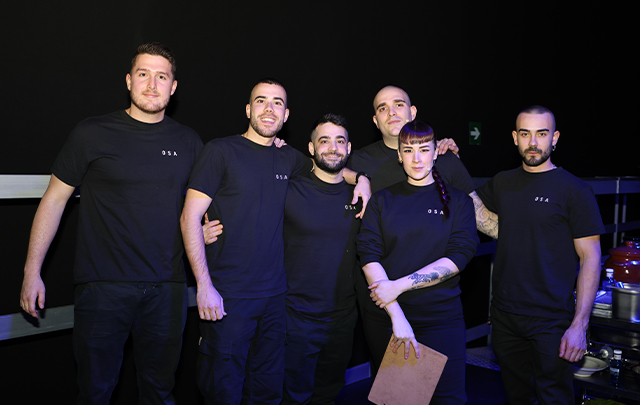News
Tradition without noise on the banks of the Manzanares River

Chefs Sara Peral and Jorge Muñoz sum up their philosophy in three words: mother, home and wild, as they prepare a zampone with chickpeas and aged partridge
Chefs Sara Peral and Jorge Muñoz met at Mugaritz during their formative years. They went their separate ways until they "locked themselves in'' together, to find their own language in the kitchen. "We are not the restaurants we used to be in", says Peral, speaking at the auditorium of Madrid Fusión Alimentos de España. "We locked ourselves away for two years to find our own identity. We wanted to abstract ourselves from everything that could influence us. We wanted to break away from what is established in Madrid’s gastronomy today. Our pillars are three words: mother, home and wild".
While preparing a zampone (a typical Italian Christmas dish, a "stuffed leg of pork accompanied by a dish of chickpeas"), the chefs explain the meaning that these three words have for them in their home. "We call 'mother' to recover the tradition, to recover the books," explains Muñoz. "It begins in 2021 with old recipe books from Castile and the rest of Spain, to recover the paper and escape from audiovisual methods. It's a way of expressing our feelings in the kitchen".
Once the leg of pork is boned up to the ankle on the worktop, a "sort of stocking" is left over, "stuffed with its own meat and extra fat, such as lard and bacon". A little wine is added and the remaining skin is sewn up to make it airtight. The recipe for zampone, which Osa calls the "preservation method", is the "traditional" one, except that the leg goes through a drying chamber in their restaurant.
"The second word, 'home', refers to our house, which is out of the noise, out of the heart of Madrid," says Muñoz. "We found this little house on the banks of the Manzanares River. From there we looked for a series of suppliers. Not everyone can supply us like they do to other restaurants. Sustainability means that the supplier and his family can eat, that the cooks know what is good and what is bad, and that the customer has a balance between what he pays and what he eats".
The chickpeas that accompany the pork, cooked in a net in a pressure cooker, are an example of this idea of a close and quality product. "Most of our broths are made in a pressure cooker, a technique we have inherited from our mothers, which reduces the aromas more". The legumes come from Daganzo, in the same region of Madrid, "kilometre zero". "The third point is 'wild'. We're not talking about offal or game. For us it is primitivism, the search for tradition. If the avant-garde doesn't improve on tradition, we stay in the old way," says Peral. "We are not stars, but we listen to rock. We have very different voices, but when we cook we sound like one".
"Our dishes are very conceptual," says Muñoz. "Two or three elements, but spoon dishes have to be in restaurants". The "wild" is ratified in the second dish, which is prepared in front of the audience. It consists of two wild partridges, matured in a chamber, hung by their heads for five days, then plucked, gutted and turned. It is prepared fried in lard.











































































